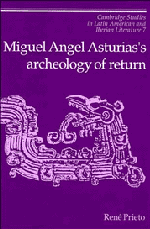Book contents
Summary
Miguel Angel Asturias is unique among authors of note for having his most flamboyant writings overshadow his best. He basks in the limelight for all the wrong reasons, undeservedly deprived of all rightful recognition by the extravagance of his own originality. To compound matters, and in spite of all appearances to the contrary, he is among the most persistent saboteurs of the tribute he merits. I say this because he always maintained that the one and only function of a Latin American author was to unveil the political reality of his country. But to reveal this reality the author must teach, an activity that, by definition, demands reaching a public and, above all, being understood by that public. And yet, Asturias wrote a number of formidable neo-Indigenista works in which, missionary fervor and didactic intention notwithstanding, he avowedly made “no concessions” to the reader (Harss, 110). This is so true, in fact, that these works – the Leyendas de Guatemala (1930), Hombres de maíz (1949), Mulata de tal (1963), Clarivigilia primaveral (1965), Maladrón (1969), and Tres de cuatro soles (1971) – remain misunderstood to this day.
By limiting the activity of the Latin American author to a more or less compelling form of proselytism, Asturias slights by implication artists unencumbered with social responsibility whose writing responds exclusively to the calling of their own inspiration. In other words, he implicitly ties a noose around the neck of his own hermetic neo-Indigenista fiction and casts with his own hands the mold of catechizing author that he has been burdened with ever since.
- Type
- Chapter
- Information
- Miguel Angel Asturias's Archeology of Return , pp. 1 - 15Publisher: Cambridge University PressPrint publication year: 1993



